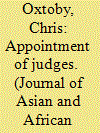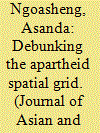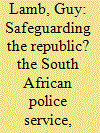|
|
|
Sort Order |
|
|
|
Items / Page
|
|
|
|
|
|
|
| Srl | Item |
| 1 |
ID:
178237


|
|
|
|
|
| Summary/Abstract |
South Africa’s Constitution provides multitudinous examples of clear breaks from past governance structures and practices. Regarding the judiciary, one of many significant changes has been in how judges are appointed. Prior to the onset of constitutional democracy, judges were appointed by the executive, with consultation with the senior judiciary but little or no scope for broader input from any other stakeholders. The Constitution established the Judicial Service Commission (JSC), one of the major functions of which is to recommend the appointment of judges. The JSC was intended to mark a decisive break with the previous appointment system, by creating a broad-based structure that includes politicians, lawyers and judges. The JSC interviews prospective candidates for judicial office in public and provides the opportunity for other stakeholders to engage in the process. This article assesses the performance of the JSC over the first 25 years of South Africa’s constitutional democracy. Several shortcomings will be discussed, including the failure of the commission to develop and apply clear and consistent criteria, challenges with implementing demographic transformation of the judiciary, managing the role of politicians and politics in the judicial appointment process, and an apparent aversion to appointing independently-minded judges, informed at least in part by a restrictive understanding of the principle of the separation of powers.
|
|
|
|
|
|
|
|
|
|
|
|
|
|
|
|
| 2 |
ID:
178233


|
|
|
|
|
| Summary/Abstract |
After almost 25 years of what could justifiably be called transformative change in South Africa, a truism is that the country’s new legal order, established by the Constitution in 1993 and 1996, provides the critical foundation of peace and security upon which its freedom has been built. The Constitutional Court was one of the most important of the new democratic institutions in the shaping of the country’s position as a constitutional democracy, upholding the values for which millions of people, black and white, had fought. This article is a brief reflection on the role of the Court in establishing the meaning of this democracy and giving it effect. The main goal of the article is to understand how the Court’s new jurisprudence works in particular contexts, how its work is related to crime and punishment, and what it means for the rights of marginalised groups in society. Using the examples of the Court’s decision in Makwanyane on the death penalty, and the Court’s decision on the findings of the Public Protector’s report on Nkandla, the article finds that the Court’s new jurisprudence takes quite a different view of legal developments in South Africa, insofar as the jurisprudence entrusts broad discretion to the Court and emphasises the need for sustained leadership of the Court to advance the battle for fundamental human rights, the rule of law, and democratic accountability.
|
|
|
|
|
|
|
|
|
|
|
|
|
|
|
|
| 3 |
ID:
178253


|
|
|
|
|
| Summary/Abstract |
Traditional universities are often interrogated on their pedagogic underpinnings, while universities of technology are often left unchallenged on knowledge production. Universities of technology are often assumed to be transformed because they are a post-apartheid creation, with a mainly black, working-class student body. This assumption has led to little interrogation of the university of technology and its relationship with knowledge production. This paper explores the nature of curriculum contestation and reform at a university of technology. It outlines the historical context of a university of technology and its approach to curriculum development, which has implications for current curriculum transformation efforts. Using autoethnographic research methodology, the paper tracks a multi-year journey towards the development of a transformative, socially just curriculum intervention in the extended curriculum programme for the Architecture and Interior Design programme at a university of technology. The paper concludes that curriculum change does not happen in a vacuum, that it is political, difficult and emotionally taxing, and that it is best done in collaboration with different education stakeholders.
|
|
|
|
|
|
|
|
|
|
|
|
|
|
|
|
| 4 |
ID:
178248


|
|
|
|
|
| Summary/Abstract |
Leading feminist scholars and activists have critiqued the current impact of South Africa’s provisions for gender equality and sexual rights. The country boasts one of the most progressive constitutions in the world, and its formal mechanisms for gender transformation and sexual citizenship are – at a global level – pathbreaking. At the same time, however, violence against women, gender non-conforming people and gays and lesbians or ongoing gender-based injustices in workplaces, educational institutions and many homes testify to the fact that such measures have not transformed ideological beliefs, institutional cultures and power relations in many public and domestic contexts. This article confronts the disjuncture between the formal provision of rights and actual practice, by analysing the effects of provisions devoid of transformative impact. It is argued that the country’s seemingly democratic arrangements for gender justice and sexual citizenship reproduce new forms of governmentality, biopolitics and biopower. By drawing on the work of Jasbir Puar, the article argues that South Africa’s imagining as a democratic state is based largely on its provision of rights around sexuality and gender, and in relation to peripheries that are ‘measured’ by the absence of these. In the global imagining, gender equality and sexual citizenship currently serve as tropes for definitive freedoms and democracy. The recognition of gender equality and sexual citizenship ratifies a particular international understanding of ‘democracy’, one that is congruent with global neoliberal standards, and that actively reproduces the gendered, heteronormative, classist and racist status quo.
|
|
|
|
|
|
|
|
|
|
|
|
|
|
|
|
| 5 |
ID:
178251


|
|
|
|
|
| Summary/Abstract |
With a focus on contemporary South Africa, and through the lens of queer identity and politics, the article critiques the limitations and possibilities for queerness and its futures in post-apartheid South Africa. From the advent of constitutional democracy and its ushering in of human rights, the article analyses developments in the politics of sexuality in the context of enduring systems of violence, rooted in colonial and apartheid histories. Discrimination against lesbian, gay, bisexual, transgender and intersex people – at the intersection with other forms of discrimination – has emerged as a focal point for political resistances in the post-apartheid period. These resistances are interrogated, including the paradoxes of rights struggles that they expose, and the contradictions between formal equality gains and present queer realities that they call attention to. With an emphasis on enduring inequalities within post-apartheid society, and on the racialisation of violence against queerness, the article explores various political formations of and for queer freedom. In navigating these dynamics of inequality and difference, the article urges a radical politics – both for relating as equals, and against the violent ends of othering.
|
|
|
|
|
|
|
|
|
|
|
|
|
|
|
|
| 6 |
ID:
178242


|
|
|
|
|
| Summary/Abstract |
This paper explores debates and politics over the place of regulatory democracy in contemporary South African constitutionalism. Twenty-five years after the formal legal transition from apartheid, regulatory institutions – by and large not the focus of negotiations in the early 1990s – have increasingly assumed prominence within the South African state. Such organisations and their functions do not fit easily within one ‘branch’ of the classic legal theory of the separation of powers into three parts, namely the judiciary, the legislature, and the executive. A typology of regulatory institutions in the South African polity includes at least four distinct types. The work of these regulatory organisations in formulating and implementing law in post-apartheid South Africa has become significant in politics, especially over the past decade. While the existence and operation of regulatory institutions does not itself comprise the whole of regulatory politics, such organisations do constitute a crucial component of and locus for such politics.
|
|
|
|
|
|
|
|
|
|
|
|
|
|
|
|
| 7 |
ID:
178245


|
|
|
|
|
| Summary/Abstract |
Since 1994 the South African Police Service (SAPS) has undertaken various efforts to build legitimacy in South Africa. Extensive community policing resources have been made available, and a hybrid community-oriented programme (sector policing) has been pursued. Nevertheless, public opinion data has shown that there are low levels of public trust in the police. Using Goldsmith’s framework of trust-diminishing police behaviours, this article suggests that indifference, a lack of professionalism, incompetence and corruption on the part of the police, particularly in high-crime areas, have eroded public trust in the SAPS. Furthermore, in an effort to maintain order, reduce crime and assert the authority of the state, the police have adopted militaristic strategies and practices, which have contributed to numerous cases of excessive use of force, which has consequently weakened police legitimacy in South Africa
|
|
|
|
|
|
|
|
|
|
|
|
|
|
|
|
| 8 |
ID:
178240


|
|
|
|
|
| Summary/Abstract |
Over the last 25 years, South Africa’s regional and global stature has been in flux. Although there is continuity in its foreign policy objectives, there have been changes in emphasis and application. These changes, together with shifts in the domestic political and economic landscape, have impacted negatively on South Africa’s international relations. President Cyril Ramaphosa, in his 2018 State of the Nation Address, boldly proclaimed a ‘new dawn’ for South Africa. A key aspect of the intended new dawn is the repositioning of South Africa regionally and globally. This paper examines the shifts and the continuity in South Africa’s foreign policy, and the reasons for its waning global and regional stature. The paper argues that South Africa is once again in a position to be a norm- and agenda-setter, especially in relation to peace and security, but that this will be a lost opportunity if there is a lack of the necessary reflection, visioning and redress needed for transformation.
|
|
|
|
|
|
|
|
|
|
|
|
|
|
|
|
| 9 |
ID:
178239


|
|
|
|
|
| Summary/Abstract |
Newfound hope was seen in South Africa on 27 April 1994, when the country held its first democratic elections. In that spirit, South Africa acceded to the 1951 United Nations Refugee Convention and agreed to uphold its promise of protecting the most vulnerable. However, 25 years on, refugees have experienced increased exclusion and rights violations. The last 25 years have brought with them numerous struggles for refugee communities, including violence, institutionalised xenophobia and a lack of political will. How do we get back the momentum and spirit that paved the way for democracy in South Africa? While South Africa has robust legislative measures, a sense of humanity has been lost in their implementation. This article offers an overview of what it means to be a refugee in democratic South Africa, and it asks whether we can trust our democracy to protect the most vulnerable. By exploring the day-to-day obstacles that refugees encounter from the moment they arrive in South Africa, this article aims to highlight the systematic breakdown of the generous laws that are supposed to protect refugees. The law can work, but an ‘injection of humanity’ is needed in public and private life to ensure that the vision of democracy is upheld.
|
|
|
|
|
|
|
|
|
|
|
|
|
|
|
|
|
|
|
|
|